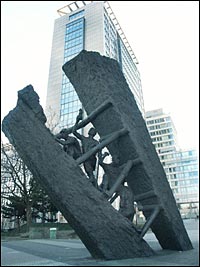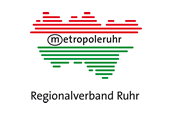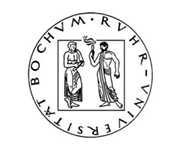Main topic: Renewing the economy
Subtopic: The quaternary sector and the competence field economy

Quelle: Autorenteam
The factors from outside (pressure to change, ICT as the new basic technology, globalisation in form of global competition of the regions) are intensified by factors from inside as the consequences of the final phase of the coal and steel era, by a structural policy that has to cope with a ?delayed region?, by the demographic change and its effects on the regional (labour) markets and finally by depressed public budgets.
Even if the blockings of properties, education and innovation have been abandoned ? but not the blocking of interurban cooperation -, the renovation of the economy is still a precarious challenge. The delayed and therefore now time-lapse change from the coal and steel industry to a knowledge-based economy is impeded by too small a potential of a (highly) qualified workforce and of newly established new technology firms and quaternary services. Attractive jobs in finances, media, arts and culture, in research, pharmaceuticals and in ICT are mostly to be found elsewhere. Health care, mechanical engineering/plant construction and logistics, however, could relative extensively be developed and have become the columns of the regional competence field economy.
The competence field economy approach The regional policy concept of the competence field economy (a variant on cluster economy) follows the approach of ?strengthening the regional strengths?. A network of basic companies (preferably large companies as ?cores of attraction?), suppliers, business services (e.g. consulting, patent law, marketing) and research institutions is developed along a product chain. Silicon Valley and Cambridge/UK can serve as examples of such quickly growing clusters. They acquire a global competitiveness by a high degree of innovative ability which ensues from spatial proximity, personal networks and mutual confidence in cooperation processes and in the interchange of ideas and information. What is needed is a critical mass of actors, an international/global core company and some form of institutionalizing (e.g. a common cluster management).
At present, the regional organisation ?Economic Marketing Metropolis Ruhr? (Wirtschaftsförderung Metropole Ruhr, wmr) favours seven competence fields (a) the branches energy, logistics, health care/medical technology, chemistry, all of them based on the traditional competences of the old industries, (b) the cross-over technologies nanotechnology, micro systems technology and material technology that have proved to be fast growing branches in the last decades.
It must be asked if this concept with its high demand of regional networking can give sufficient impulses in comparison to digital networks and if the means available are sufficient.
To the abstracts of other main chapters:
1. Fundamentals and beginnings
2. The era of the coal and steel industry
3. Renewing the infrastructure
4. Renewing urban areas
6. Perspectives for the future
1. Fundamentals and beginnings
2. The era of the coal and steel industry
3. Renewing the infrastructure
4. Renewing urban areas
6. Perspectives for the future



